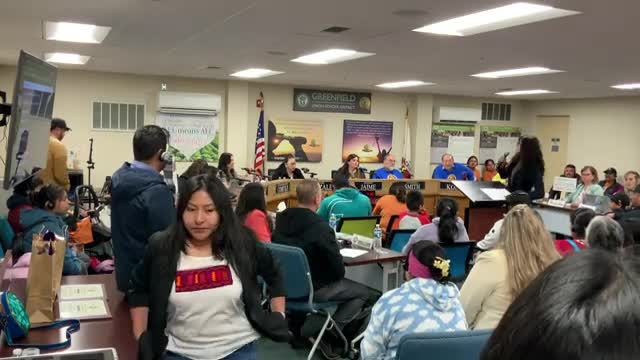Parents press Greenfield Union for in-person interpreters, indigenous-language support and expanded after‑school access
Get AI-powered insights, summaries, and transcripts
Subscribe
Summary
At the Greenfield Union School District board meeting on March 13, parents and community members asked the district to provide in-person interpreters in school offices, expand indigenous-language programming and ensure after-school services include language access and culturally relevant activities.
At the Greenfield Union School District board meeting on March 13, parents and community members asked the district to provide in-person interpreters in school offices, expand indigenous-language programming and ensure after-school services include language access and culturally relevant activities.
Legal counsel Colina Ayala Papon began the public-comment period with a reading of Government Code section 54954.3 to clarify when members of the public may speak. “Every agenda for a regular meeting shall — shall means must — provide an opportunity for members of the public to directly address the legislative body,” Ayala Papon read, emphasizing that public comment may occur “before or during the legislative body's consideration of that item.”
Multiple speakers said language access problems are affecting families’ ability to access services. “I brought that form to the district so that my child can get speech therapy, but the staff said… it was difficult to get a hold of the director,” said Ethan Martinez, identifying himself as affiliated with Centro de Nacional. Martinez requested in-person interpreters to help families who speak Mixteco and other indigenous languages.
Other residents made similar requests. Pedro Merino Flores and Daviana (Fabia) Ramirez asked for Spanish and indigenous-language support at school sites and in after‑school programs so parents and children can communicate with staff. Victoria Martinez Salvars urged the district to preserve students’ native languages and cultural practices in school programming.
Speakers also raised procedural concerns about physical access and equitable participation in meetings. Clarissa Reyes, a program representative, said families who needed interpretation or who had come for a presentation were asked to move to a separate room at a prior meeting, and she urged the district to avoid separating parents “potentially based on language or race or ethnicity.”
District staff and board members responded during and after public comment. A district staff member described existing partnerships with community organizations that place bilingual and indigenous-language staff at schools; a speaker from that partner team said their staff provide daily in‑person interpretation, help families with forms, and run culturally based after‑school activities such as traditional dance, sewing and language classes. The district’s interim superintendent thanked the community for advocacy and said the district is working in collaboration with community groups to respond to needs raised by parents.
A district staff member also noted interpreters used by the district are “professionally trained interpreters,” a point offered to address earlier comments about interpretation quality.
The public comments came during the board’s designated public-comment period and also touched on items the district is discussing in its Local Control and Accountability Plan (LCAP) planning season. Board members acknowledged the requests and said they intend to continue conversations with community partners and staff to coordinate services and follow up.
The board did not take a formal vote on language-access policy or a specific after‑school expansion at the March 13 meeting. Community speakers asked for ongoing follow-up and for the district to ensure future meetings and outreach are accessible to families who require interpretation.
